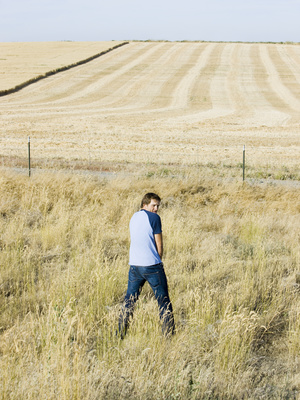Too Bashful To Pee: Dealing with Shy Bladder Syndrome (Paruresis)


HOW MANY OF US as adults have had the experience when at a ballgame momentarily “forgetting” how to urinate standing next to a row of other fans at a “trough” urinal? Or feeling the pressure of a line behind you to use the urinal or stall and then finding that the more you want to urinate the more unable you are to actually do it? Have you had the experience, after having undergone a diagnostic or surgical procedure, that for a while you couldn’t quite remember how to pee? These are quite common experiences of what some have termed “pee panic” or “pee amnesia”. Imagine not being able to urinate in public-no matter how much you may want to – not just momentarily but all of the time. Think how restrictive it would be on your life, how difficult it would be to take a plane flight, go to a concert, go to a bar with friends, maybe even have a romantic relationship.
Shy Bladder Syndrome (Paruresis)
Shy Bladder Syndrome or Bashful Bladder Syndrome (technical term: Paruresis) is the term for that life restricting difficulty. People with Shy Bladder Syndrome often cannot urinate when other people are close by. Often people feel intense shame and humiliation over not being able to be able to urinate in public. People who struggle with this have to carefully plan their excursions out of the house in order to use restrooms that are rarely used by others. Some individuals arrange their days to NEVER have to urinate in public- they are able to urinate only in the safety of their own homes. Life can become very restricted for the 21 million Americans (7% of adults) who are estimated to suffer from Paruresis.
At the Cognitive Behavior Therapy Center of Southern California, we can help with this condition. Just like with other anxiety problems, you can learn, at your own pace, to face your fears and recover the ability to urinate in public restrooms and live fully. Do you have Shy Bladder Syndrome?
Take the Paruresis Test below to find out.
Do you:
- Have difficulty urinating when other people are, or might be, nearby?
- Find that you are afraid that others might notice if you have trouble voiding?
- Find that you are afraid that others might make fun of your difficulty in urinating?
- Tend to avoid using public restrooms if others are in the restroom?
- Tend to avoid frequently trafficked public restrooms?
- Tend to avoid long trips by plane, boat, train, bus, or car due to this difficulty?
- Restrict the amount of liquid you drink to reduce the production of urine?
- Tend to avoid drinking alcohol, tea, or coffee for the same reason?
- Turn down jobs because the work restrooms are too exposed and not private enough?
- Find that this difficulty interferes with your friendship and/or romantic relationships?
- Experience significant shame and humiliation having this problem?
If you have answered many of the above questions with “yes”, then you might be suffering from Paruresis. Cognitive Behavioral Therapy (CBT) has been shown to help people with Shy Bladder Syndrome learn to be able to urinate more freely and confidently in public restrooms and to increase the sense of freedom to live one’s life.
Contact Us and let us help you live a life of freedom!

Author Dr. Rodney Boone is the Founder and Director of CBT SoCal, has taught as a former member of the faculty in UCLA’s Department of Psychiatry, and practices in Glendale and Torrance, CA.

V. Fisher
My adult son has a very restrictive life due to Paruresis. Medical reasons for his shy bladder have been ruled out. He already takes Alprazolam and Gabapentin for anxiety. I read these two medications are recommended to help with shy bladder. My son is willing to try Cognitive Behavior Therapy. How can we find a Therapist in our area who had treated other for this same issue? It is a big deal that he is willing to try this. Don’t want to set him up for disappointment with a therapist not experienced with this issue.
Lara
I have a boyfriend who has hydronephrosis.
Swollen kidneys. He seems to be unaware
when he has to pee. Once I even had to pour
water on his head for him to stop talking and
being cerebral, because I could tell by his body
language, and vocal intensity that he had to urinate.
Some people are really miserable and
don’t even know it, and that they have a problem
Martin Hsia
That’s encouraging that he is open to getting the right help! I would recommend searching online for CBT specialists in the area, and inquiring specifically with them if they have experience treating problems with Paruresis specifically.
Martin Hsia
Indeed, it can be really severe issue and there is so little awareness of it. Hopefully that will change.